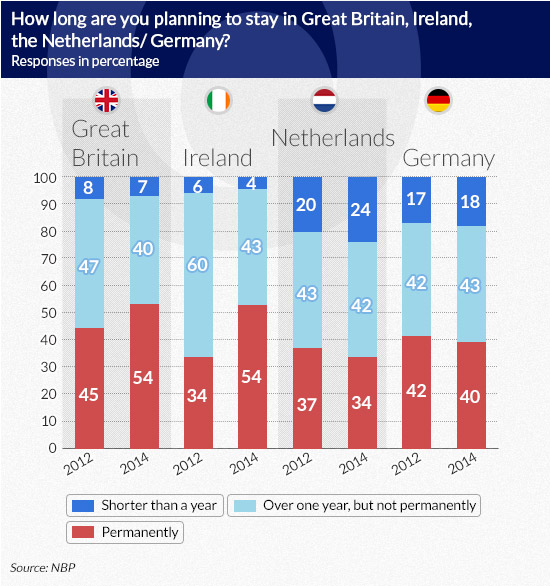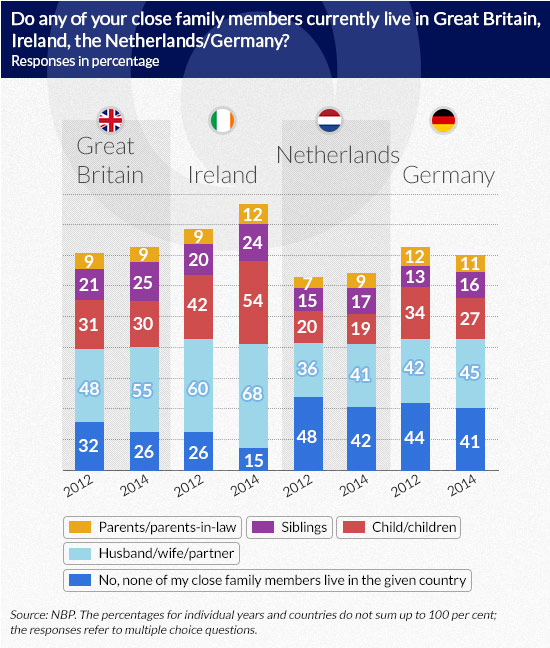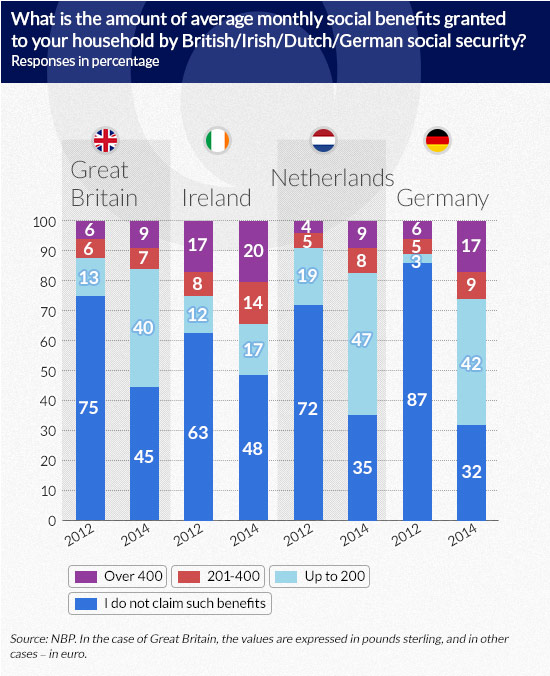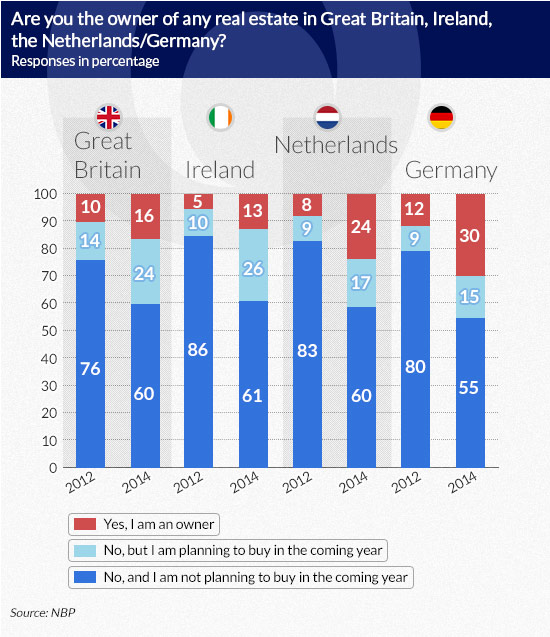Tydzień w gospodarce
Category: Trendy gospodarcze

(Infographics: Darek Gaszczyk)
According to the NBP (Narodowy Bank Polski, central bank of Poland) survey, in the years 2012-2014 the percentage of people planning permanent residence in Ireland and Great Britain increased by 20 and 9 percentage points, respectively. In both countries, 54% of Poles say they plan to stay permanently. In the case of the Netherlands, only 34% of Poles planned to stay for good, while in Germany the figure was 40%.
The seasonal nature of work performed by Polish migrants in the Netherlands and Germany may be a reason for the much higher proportion of people planning to stay there for less than a year. In all, 24% of Poles in the Netherlands plan to be there for less than a year and 18% of those in Germany also estimate their stay at less than 12 months.
By contrast, only 7% of migrants to the UK and 4% to Ireland plan to be there less than a year. The majority of migrants in the Netherlands are employed in the agricultural and gardening sector, whereas in Germany a large number still work in the construction sector.
The greater interest in a long-term stay in Great Britain and Ireland among the respondents is also confirmed by answers to other questions. In the Netherlands and Germany, although the proportion of migrants intending to stay abroad permanently slightly decreased at the turn of the last two years, the responses to other questions may indicate that people who declared their willingness to stay abroad permanently have been more involved in the settlement process outside Poland.
In the survey conducted in 2014, in all countries the percentage of respondents living abroad without any family decreased compared to the survey of 2012. The highest decline was recorded in Ireland (11 percentage points), while the corresponding values for Great Britain and the Netherlands amounted to 6 percentage points and for Germany ― 3 percentage points.
At the same time, depending on the country, the proportion of people living outside Poland with a husband/wife/partner, children, parents/parents in law and/or siblings has increased. The largest increase in the percentage was recorded in the case of migrants living in Ireland with children (12 percentage points). This growth seems to result from starting families abroad rather than from the arrival of children joining the parents. This is demonstrated by the corresponding growth in the number of migrants whose families consist, among others, of children (13 percentage points).
Consequently, in 2014 only 15%of migrants in Ireland lived there without their family, in Great Britain it was 26%. However, in the Netherlands, 42% were there alone and in Germany it was 41%. The details are illustrated in the chart below:
The proportion of people claiming social benefits abroad has also significantly changed. In 2014, the proportion of people not claiming social benefits abroad decreased in Great Britain by 30 percentage points, in Ireland ― by 15 percentage points, in the Netherlands ― by 37 percentage points, and in Germany ― by 55 percentage points (Chart 3). This may result from the fact that they started families abroad, and consequently gained the right to receive those benefits.
Moreover, in response to the question concerning the place where emigrants plan to spend their savings, the proportion of people planning to spend money in Poland has decreased, whereas the share of those planning to spend their savings in the country of migration has increased. Once again, the most visible change occurred in Ireland. The proportion of people planning to spend their savings in Poland fell by 15 percentage points, while the proportion planning to spend their savings in Ireland increased by 19 percentage points. In Great Britain, the Netherlands and Germany, the share of the first group decreased by 1 percentage point, 3 percentage points and 4 percentage points respectively, whereas the proportion of people planning to spend their savings abroad increased by 9 percentage points in Great Britain, has not changed in the Netherlands, and increased by 3 percentage points in Germany.
Some plans related to spending savings abroad may be associated with the purchase of real estate abroad (Chart 4). The percentage of migrants who do not own real estate abroad and do not intend to purchase real estate over the forthcoming year decreased in Great Britain by 16 percentage points, in Ireland ― by 25 percentage points, in the Netherlands ― by 23 percentage points, and in Germany ― by 25 percentage points. In Great Britain and Ireland, this decline was offset mostly by the increased proportion of people who do not own real estate but intend to purchase real estate in the coming year. In the Netherlands and Germany, the increase in the number of people already owning real estate was predominant.
The survey was taken from 15 October to 25 November 2014, using face-to-face interviews among Polish migrants working in Great Britain, Ireland, the Netherlands and Germany. It was a consecutive survey implemented by NBP since 2007 (excluding the year 2013). The sample size for Great Britain and Germany was 1500, in Ireland – 1000 people and in the Netherlands – 700 people. This survey looks at two sets of issues: (i) the situation of migrants in the labour market, taking into account their social and demographic behaviour, (ii) economic aspects, with special attention to remittances to Poland from migrant workers.






